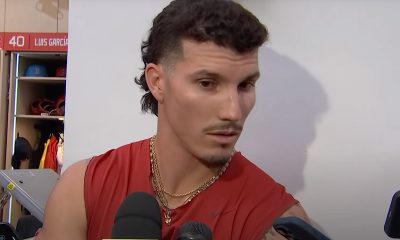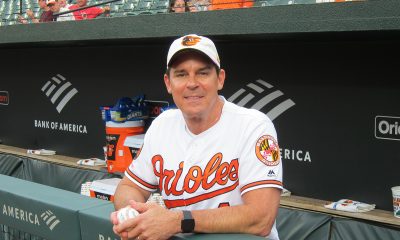Sports
Out behind the scenes in pro sports
Managers, umps and more enjoy life after the closet in sports
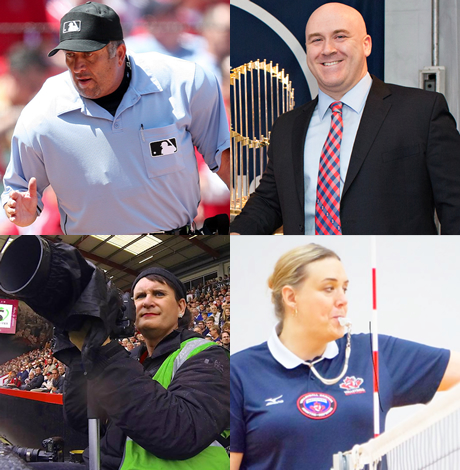
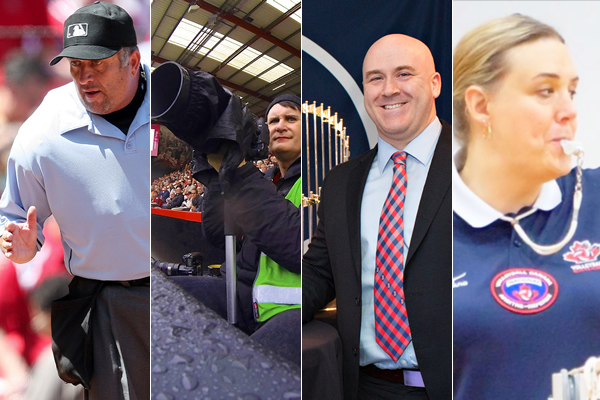
(Photos courtesy of the subjects)
When professional athletes and coaches come out as LGBT, their stories make international headlines, but what many sports fans don’t realize is that it isn’t just players and coaches making waves of progress in the sports world. Those working behind the scenes and on the sidelines for some of the world’s favorite sports and teams are inspiring others with their coming-out stories.
David Baggs, senior manager and creator of the Red Sox Sales Academy
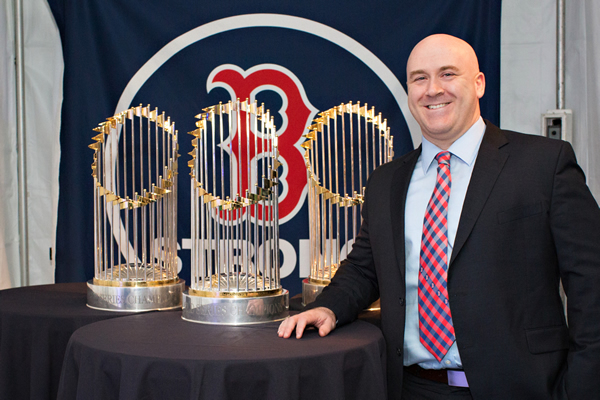
David Baggs
David Baggs thought being gay and working in sports was impossible. This summer, inspired by a talk Billy Bean gave to the Red Sox, Baggs realized he was wrong.
Baggs, 41, has worked in sports for 11 years, managing sales for teams like the L.A. Dodgers, Tampa Bay Rays, 49ers and now the Boston Red Sox. He’s been out to his family and friends since the start of his career, but just came out professionally.
“I’m looking around the room to my colleagues who I’m not out to yet, and people are tearin’ up and they’re visually moved,” Baggs recalls of Bean’s talk. “He’s kinda funny about it, but it’s also very moving. That week I decided to send a video to our president basically coming out to him.”
On June 2, Baggs published a letter in Outsports coming out publicly in an effort to inspire other LGBT community members within the sports world.
“I tried to keep my personal life to myself and felt like I couldn’t share that with my colleagues. That’s now a ridiculous idea,” Baggs says. “Don’t expect anyone to be authentic with you if you don’t share anything with them. If I were to go back, I’d say get it over with. You’ll blossom as a professional because you’re not worrying about what other people think. You can just tell them what you’re doing after work instead of making up some stupid story.”
Baggs says he has encountered overwhelmingly positive reaction since coming out, receiving supportive notes and Facebook posts from former colleagues, former Legends boss and current San Francisco 49ers President Al Guido, the Legends/Levi Stadium staff and the Tampa Bay Rays.
“I’m thankful for everywhere I’ve worked, but the Red Sox provided the support which eventually made me comfortable enough to come out,” Baggs says. “I think it is important that within the sports world there are leaders who are willing to stand up for their employees, colleagues, fans and be supportive within their communities for LGBTQ issues. If you are in a position to potentially move the conversation forward you’re basically obliged to do it within the sports world.”
Sophie Cook, Bournemouth football photographer (UK), Brighton News LGBT TV correspondent
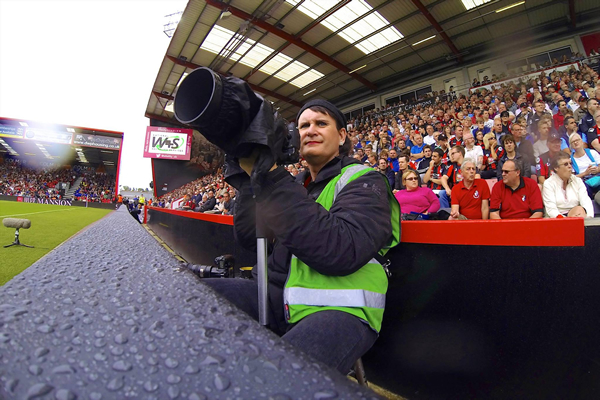
Sophie Cook
As Sophie Cook, 49, stood in the pitch while her team, AFC Bournmouth was promoted to the Premier League and crowned football league champions, she was terrified. For her and the players showering her in Champagne, this was the greatest day in the history of their club, a day they had waited for all their lives. But it might also be the last time Cook worked as a football photographer. Over the summer she planned to tell the team she no longer wanted to be called Steve.
Cook, a single parent of three from Brighton, England, started out as a shirt sponsor for a semi-pro football team. Realizing she’d only get good pictures of the shirts if she took them herself, Cook became the team’s photographer. After taking their pictures for eight seasons, Cook switched to the pro game with AFC Bournemouth. In July, 2015 she stood in front of the newly promoted team and came out as the first trans person to work in the Premier League.
In a phone call before the meeting, the other line went silent, but the manager of the club assured Cook she still had a job.
“How can I make this easier for you,” manager Eddie Howe asked. Cook replied that she’d need to meet with the team.
“He can never be expected to understand what I was going through, but just by asking, ‘What can I do to make this easier for you?’ That’s all you can ask of someone when you come out,” Cook says.
Howe stood in front of the team with Cook and re-introduced her.
“You’ll probably notice our photographer has changed a little from last season, lost a bit of weight, and grown her hair out a bit,” Howe said. “I’d like you all to meet Sophie.”
Captain Tommy Elphick started clapping and the rest of the team quickly joined in.
“Well let’s go train!” Elphick said. And that was it. “I was expecting rainbows and things to come flying out of the sky, but they got the new information and it really wasn’t a big deal,” Cook says. “It was all dealt with really nicely. It feels amazing to be part of the history of a club that I love.”
Cook is now the first European news anchor as an LGBT consultant for Brighton’s Latest TV.
“It’s a great experience and for me the most amazing part of that is that I’m in the center of the LGBT community in the most diverse city in all of the U.K.,” Cook says. “Twenty-five percent of the population in Brighton is LGBT and my boss wants me to make 25 percent of the programming LGBT, which is a very important thing. This weekend we have Brighton Pride and to be out on the streets reporting on it, interviewing people and trying to bring that diversity to people’s TV screens is such an honor and something I’m very excited about for in the future.”
Dale Scott, MLB umpire
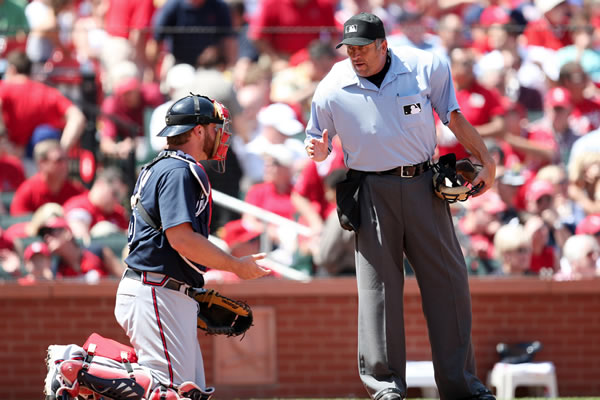
After 31 seasons of umpiring for the MLB, working three World Series, three All-Star games and numerous divisional and league championship series, Dale Scott never thought coming out would be one of the biggest moments of his career.
When Referee Magazine editors asked him to send pictures for their 2014 story on him, Scott didn’t think twice about the picture he chose of him and his partner, Michael Rausche. After all, he and Rausch had been together for 28 years, and Scott had been out quietly to friends, family and a few co-workers for his whole career. What Scott didn’t realize was how big of an impact he made by coming out publicly.
Scott’s coming out was even joked about on “Late Night” by Jimmy Fallon. He began receiving congratulations on the field and over emails, texts and even international calls.
“It has truly been a very uplifting and positive experience,” Scott says.
In 2010, Scott was able to add Rausch as his domestic partner in his new umpires union contract, making their relationship official in the MLB.
“The first 10 years of my Major League umpire career, I would have been horrified if a story had come out that I was gay,” he told Outsports. “At first I was uncomfortable because I had spent my whole life hiding that fact from people even though I wasn’t hiding it from myself or my friends.”
Like Baggs, Scott credits the ease of his coming out to MLB vice president Billy Bean.
“He is someone who has opened the door in all of baseball at both the major and minor league levels and I’m very proud to call him a friend,” Scott says.
Scott and Rausche celebrate 30 years together this October.
Stephanie Shostak, Volleyball Alberta president
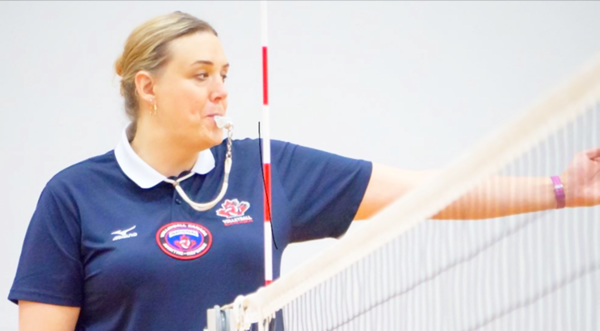
Stephanie Shostak
Halfway through her referee certification process in 2013, Canadian Stephanie Shostak considered hanging up her whistle. She knew there had never been anyone like her in her field.
At 41, Shostak would be the first high-level referee to ever come out as transgender.
“I didn’t know how anyone would take it,” Shostak says. “I didn’t know what the response would be from Volleyball Canada or U.S. Volleyball. I knew of other athletes that came out gay, lesbian or bisexual, same with coaches and refs, but I’d never encountered anyone being transgender. It played into my decision but I loved the sport so much that I couldn’t walk away from it.”
That summer, Shostak sent a memorandum coming out to Volleyball Canada and U.S. Volleyball. After receiving support from both organizations and being re-elected as VAO president, Shostak decided to write an article coming out to the public this past April.
“I thought it would be worthwhile to do the article if I could just help one individual,” Shostak says.
Since then she’s helped many trans people, making sure they all know someone like them.
After Shostak refereed a national championship in Canada this year, she met two parents who said they saw her article and wanted to introduce her to their daughter, who is also transgender. Shostak recognized the young woman from the court of the team she just refereed.
The girl asked her parents, “Why are you talking to the ref?”
They told her, “This is Stephanie, who you read about in the article last week.”
The girl’s eyes lit up and she started to cry, hugging Shostak and saying thank you.
“It’s impacts like that I totally didn’t expect,” Shostak says. “There’s a lot of negativity regarding transgender people in the U.S. and occasionally in Canada, so I just wanted to share some positivity.”
Steve Reed, Washington Nationals director of human resources
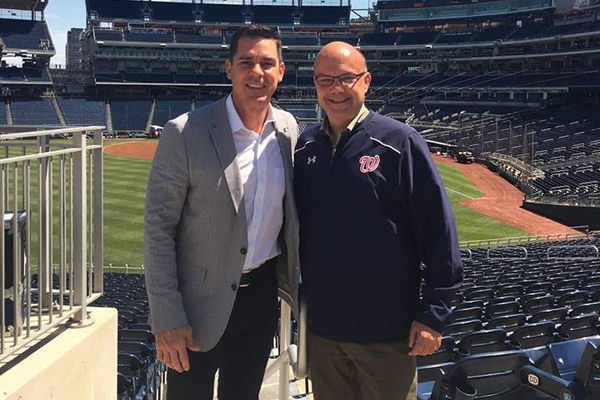
Billy Bean and Steve Reed
Two-and-a-half years ago, Steve Reed left his hometown of Kansas City, Mo., to run the human resources department of the Washington Nationals. The now 49-year-old wasted no time letting co-workers know who he is, asking his boss if he could bring his then boyfriend to an office party.
The Nationals welcomed Reed and invited his boyfriend to the party.
Now single, Reed has been comfortable being out personally and professionally for the last 10 years, but doesn’t think labels are always necessary.
“People shouldn’t be classified as either gay/straight or any other category that society wants to assign,” Reed says. “People should be judged for who they are as individuals. Those labels are not the total summation of who a person is.”
Like Scott and Baggs, Reed also draws inspiration from his friendship with MLB Vice President Billy Bean, but he’s also developed relationships with other LGBT colleagues and members of the sports world. Now in his third season with the Nationals, he’s making sure 1,700 other employees are comfortable in their jobs too.
“I love the people,” Reed says. “Whereas our employees are there to ensure the guest has a great experience, my job is to make sure the employees have a great experience. We have a great staff and I am lucky to work with such a great team.”
India
Anaya Bangar challenges ban on trans women in female cricket teams
Former Indian cricketer Sanjay Bangar’s daughter has received support

Anaya Bangar, the daughter of former Indian cricketer Sanjay Bangar, has partnered with the Manchester Metropolitan University Institute of Sport in the U.K. to assess her physiological profile following her gender-affirming surgery and undergoing hormone replacement therapy.
From January to March 2025, the 23-year-old underwent an eight-week research project that measured her glucose levels, oxygen uptake, muscle mass, strength, and endurance after extensive training.
The results, shared via Instagram, revealed her metrics align with those of cisgender female athletes, positioning her as eligible for women’s cricket under current scientific standards. Bangar’s findings challenge the International Cricket Council’s 2023 ban on transgender athletes in women’s cricket, prompting her to call for a science-based dialogue with the Board of Control for Cricket in India and the ICC to reform policies for transgender inclusion.
“I am talking with scientific evidence in my hand,” Bangar said in an interview posted to her Instagram page. “So, I hope, this makes an impact and I will be hoping to BCCI and ICC talking with me and discussing this further.”
On Nov. 21, 2023, the ICC enacted a controversial policy barring trans women from international women’s cricket. Finalized after a board meeting in Ahmedabad, India, the regulation prohibits any trans player who has experienced male puberty from competing, irrespective of gender-affirming surgery or hormone therapy. Developed through a 9-month consultation led by the ICC’s Medical Advisory Committee, the rule aims to safeguard the “integrity, safety, and fairness” of women’s cricket but has drawn criticism for excluding athletes like Canada’s Danielle McGahey, the first trans woman to play internationally. The policy, which allows domestic boards to set their own rules, is slated for review by November 2025.
Bangar shared a document on social media verifying her participation in a physiological study at the Manchester Metropolitan University Institute of Sport, conducted from Jan. 20 to March 3, 2025, focused on cricket performance. The report confirmed that her vital metrics — including haemoglobin, blood glucose, peak power, and mean power — aligned with those of cisgender female athletes. Initially, her fasting blood glucose measured 6.1 mmol/L, slightly above the typical non-diabetic range of 4.0–5.9 mmol/L, but subsequent tests showed it normalized, reinforcing the study’s findings that her physical profile meets female athletic standards.
“I am submitting this to the BCCI and ICC, with full transparency and hope,” said Bangar. “My only intention is to start a conversation based on facts not fear. To build space, not divide it.”
In a letter to the BCCI and the ICC, Bangar emphasized her test results from the Manchester Metropolitan University study. She explained that the research aimed to assess how hormone therapy had influenced her strength, stamina, haemoglobin, glucose levels, and overall performance, benchmarked directly against cisgender female athletic standards.
Bangar’s letter to the BCCI and the ICC clarified the Manchester study was not intended as a political statement but as a catalyst for a science-driven dialogue on fairness and inclusion in cricket. She emphasized the importance of prioritizing empirical data over assumptions to shape equitable policies for trans athletes in the sport.
Bangar urged the BCCI, the world’s most influential cricket authority, to initiate a formal dialogue on trans women’s inclusion in women’s cricket, rooted in medical science, performance metrics, and ethical fairness. She called for the exploration of eligibility pathways based on sport-specific criteria, such as haemoglobin thresholds, testosterone suppression timelines, and standardized performance testing. Additionally, she advocated for collaboration with experts, athletes, and legal advisors to develop policies that balance inclusivity with competitive integrity.
“I am releasing my report and story publicly not for sympathy, but for truth. Because inclusion does not mean ignoring fairness, it means measuring it, transparently and responsibly,” said Bangar in a letter to the BCCI. “I would deeply appreciate the opportunity to meet with you or a representative of the BCCI or ICC to present my findings, discuss possible policy pathways, and work towards a future where every athlete is evaluated based on real data, not outdated perceptions.”
Before her transition, Bangar competed for Islam Gymkhana in Mumbai and Hinckley Cricket Club in the U.K., showcasing her talent in domestic cricket circuits. Her father, Sanjay Bangar, was a dependable all-rounder for the Indian national cricket team from 2001 to 2004, playing 12 test matches and 15 One Day Internationals. He later served as a batting coach for the Indian team from 2014 to 2019, contributing to its strategic development.
Cricket in India is a cultural phenomenon, commanding a fanbase of more than 1 billion, with more than 80 percent of global cricket viewership originating from the country.
The International Cricket Council, the sport’s governing body, oversees 12 full member nations and more than 90 associate members, with the U.S. recently gaining associate member status in 2019 and co-hosting the 2024 ICC Men’s T20 World Cup. The BCCI generated approximately $2.25 billion in revenue in the 2023–24 financial year, primarily from the Indian Premier League, bilateral series, and ICC revenue sharing. The ICC earns over $3 billion from media rights in India alone for the 2024–27 cycle, contributing nearly 90 percent of its global media rights revenue, with the BCCI receiving 38.5 percent of the ICC’s annual earnings, approximately $231 million per year.
Women’s cricket in India enjoys a growing fanbase, with over 300 million viewers for the Women’s Premier League in 2024, making it a significant driver of the sport’s global popularity. The International Cricket Council oversees women’s cricket in 12 full member nations and over 90 associate members, with the U.S. fielding a women’s team since gaining associate status in 2019 and competing in ICC events like the 2024 Women’s T20 World Cup qualifiers. The BCCI invests heavily in women’s cricket, allocating approximately $60 million annually to the WPL and domestic programs in 2024–25, while contributing to the ICC’s $20 million budget for women’s cricket development globally. India’s media market for women’s cricket, including WPL broadcasting rights, generated $120 million in 2024, accounting for over 50 percent of the ICC’s women’s cricket media revenue.
“As a woman, I feel when someone says that they are women, then they are, be trans or cis. A trans woman is definitely the same as a cis woman emotionally and in vitals, and specially, when someone is on hormone replacement therapy. Stopping Anaya Bangar from playing is discrimination and violation of her rights. It is really sad and painful that every transwoman need to fight and prove their identity everywhere,” said Indrani Chakraborty, an LGBTQ rights activist and a mother of a trans woman. “If ICC and BCCI is stopping her from playing for being transgender, then I will say this to be their lack of awareness and of course the social mindsets which deny acceptance.”
Chakraborty told the Blade that Bangar is an asset, no matter what. She said that the women’s cricket team will only benefit by participation, but the discriminating policies are the hindrance.
“Actually the transgender community face such discrimination in every sphere. In spite of being potent, they face rejection. This is highly inhuman. These attitudes is regressive and will never let to prosper. Are we really in 2025?,” said Chakraborty. “We, our mindset and the society are the issues. We, as a whole, need to get aware and have to come together for getting justice for Anaya. If today, we remain silent, the entire community will be oppressed. Proper knowledge of gender issues need to be understood.”
The BCCI and the International Cricket Council have not responded to the Blade’s repeated requests for comment.
Sports
English soccer bans transgender women from women’s teams
British Supreme Court last month ruled legal definition of woman limited to ‘biological women’

The organization that governs English soccer on Thursday announced it will no longer allow transgender women to play on women’s teams.
The British Supreme Court on April 16 ruled the legal definition of a woman is limited to “biological women” and does not include trans women. The Football Association’s announcement, which cites the ruling, notes its new policy will take effect on June 1.
“As the governing body of the national sport, our role is to make football accessible to as many people as possible, operating within the law and international football policy defined by UEFA (Union of European Football Associations) and FIFA,” said the Football Association in a statement that announced the policy change. “Our current policy, which allows transgender women to participate in the women’s game, was based on this principle and supported by expert legal advice.”
“This is a complex subject, and our position has always been that if there was a material change in law, science, or the operation of the policy in grassroots football then we would review it and change it if necessary,” added the Football Association.
The Football Association also acknowledged the new policy “will be difficult for people who simply want to play the game they love in the gender by which they identify.”
“We are contacting the registered transgender women currently playing to explain the changes and how they can continue to stay involved in the game,” it said.
The Football Association told the BBC there were “fewer than 30 transgender women registered among millions of amateur players” and there are “no registered transgender women in the professional game” in England, Scotland, Wales, and Northern Ireland.
The Scottish Football Association, which governs soccer in Scotland, is expected to also ban trans women from women’s teams.

FIFA has announced Saudi Arabia will host the 2034 World Cup, despite concerns over its human rights record that includes the death penalty for homosexuality.
The Associated Press reported FIFA confirmed the decision on Dec. 18. The AP noted Saudi Arabia is the only country that bid to host the 2034 World Cup.
“This is a historic moment for Saudi Arabia and a dream come true for all our 32 million people who simply love the game,” said Sport Minister Prince Abdulaziz bin Turki Al- Faisal, who is also president of the Saudi Olympic and Paralympic Committee, in a statement the Saudi Press Agency posted to its website.
Saudi Arabia is among the handful of countries in which consensual same-sex sexual relations remain punishable by death.
A U.S. intelligence report concluded Saudi Crown Prince Mohammed bin Salman “likely approved” the murder of Jamal Khashoggi, a Washington Post columnist, inside the Saudi Consulate in Istanbul in 2018. A federal judge in 2022 dismissed a lawsuit against Prince Mohammed after the Biden-Harris administration said he was immune to the lawsuit because he is the country’s prime minister.
Human rights activists have also criticized the Saudi government over the treatment of women, migrant workers, and other groups in the country.
“No one should be surprised by this,” Cyd Zeigler, Jr., co-founder of Outsports.com, an LGBTQ sports website, told the Washington Blade in an email after FIFA confirmed Saudi Arabia will host the 2034 World Cup. “FIFA, the International Olympic Committee, and many other world governing bodies routinely turn to authoritarian countries with terrible human-rights records to host major sporting events. There are simply few other countries willing to spend the billions of dollars it takes to build the needed infrastructure.”
Peter Tatchell, a long-time LGBTQ activist from the U.K. who is director of the Peter Tatchell Foundation, in a statement described FIFA’s decision as “a betrayal of the values that football should stand for: Inclusivity, fairness, and respect for human rights.”
“This is not about football; it’s about sportswashing,” said Tatchell. “The Saudi regime is using the World Cup to launder its international image and distract from its brutal abuses. By granting them this platform, FIFA is complicit in whitewashing their crimes.”
Qatar, which borders Saudi Arabia, hosted the 2022 World Cup.
Consensual same-sex sexual relations remain criminalized in Qatar.
“Saudi Arabia was the only country to bid for the 2034 FIFA World Cup,” said Zeigler. “So, until FIFA, the IOC (International Olympic Committee) and other governing bodies ban major human-rights violators from hosting, we’ll continue to see events like this in Saudi Arabia, China, Qatar, and other countries with terrible LGBTQ rights issues.”
The Blade has reached out to FIFA and the Saudi government for comment.
-

 U.S. Supreme Court4 days ago
U.S. Supreme Court4 days agoSupreme Court upholds ACA rule that makes PrEP, other preventative care free
-

 U.S. Supreme Court4 days ago
U.S. Supreme Court4 days agoSupreme Court rules parents must have option to opt children out of LGBTQ-specific lessons
-

 National5 days ago
National5 days agoEvan Wolfson on the 10-year legacy of marriage equality
-

 Congress5 days ago
Congress5 days agoSenate parliamentarian orders removal of gender-affirming care ban from GOP reconciliation bill

